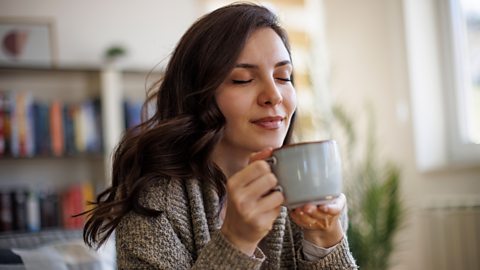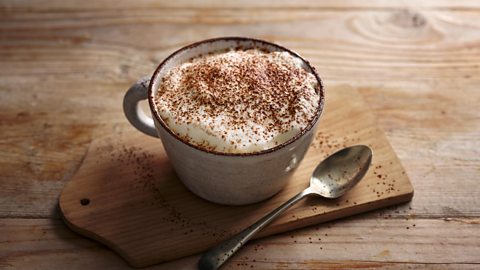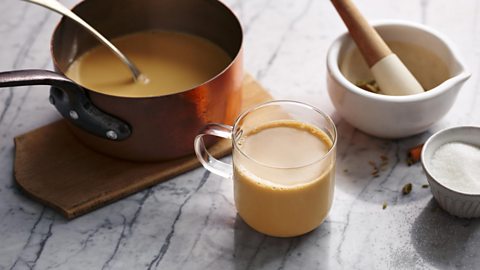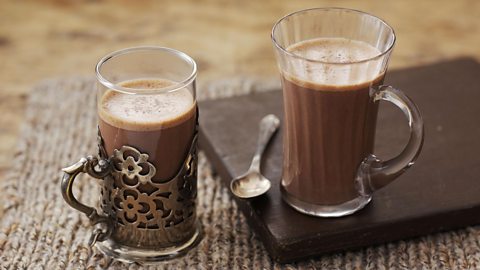Tea or coffee: which is better for you?
Brits love tea and coffee. They are the two beverages we . Sometimes we choose one over the other based on the belief itâs healthier, better for keeping us alert or for calming us, or has fewer side effects. But is there any real reason to choose between tea and coffee, other than personal preference?

Wakey wakey!
The low to moderate (40â300mg) amount of caffeine typically contained in a cup of coffee has been found to alertness, attention and reaction time, but has less consistent effects on memory, judgement and decision making.
The perfect mocha coffee
Could this coffee=based drink help keep tiredness at bay?

Thereâs evidence the effects of caffeine in a cup of tea are enhanced by an amino acid it contains, called , if it is drunk regularly. The research finds âL-theanine may interact with caffeine to enhance performance in terms of attention switching and the ability to ignore distractionâ. So if you find tea has a more positive effect on keeping you alert, you might be right!
Whatâs the price of all this extra alertness? After [5â6 hours], around half the caffeine youâve drunk will still be in your system, and after 10â12 hours, a quarter of it could still be there, according to . This means you may have trouble falling or staying asleep. âSome people tell me [they] can have an espresso with dinner and [âŚ] fall asleep fineâ, says Walker. But caffeine can decrease the amount of restorative deep sleep you have and as a consequence âyou can wake up the next morning and not feel refreshedâ, he continues.
concludes, âday-long tea consumption produces similar alerting effects to coffee, despite lower caffeine levels, but is less likely to disrupt sleepâ. Either way, itâs advisable to limit your consumption of caffeinated drinks (especially those higher in the stimulant) to a long time before you go to bed.
A calming cuppa
Rather than aiming to get a buzz, some people reach for a hot drink to relax.
A found drinking black tea âmay speed up recovery from the daily stresses in lifeâ, according to Andrew Steptoe, Professor at the universityâs Department of Epidemiology and Public Health. But âwe do not know what ingredients of tea were responsible for these effects on stress recovery and relaxationâ, he added.
Masala chai
Do you find tea relaxes you? If so, this spiced chai drink will appeal

Low-caffeine green tea to reduce stress in some people. The researchers put this down to the earlier mentioned amino acid, L-theanine, which has been found to . L-theanine is also present, in lower concentrations, in black tea.
Thereâs less research on the effects of coffee on stress, but moderate to high amounts of caffeine are linked to higher levels of .
The advises âdrinking too much caffeine can make you more anxious than normalâ. So reaching for decaf is best when youâre looking to relax.
How much do they stain your teeth?
suggests tea stains teeth more than coffee does, including . But both drinks have a staining effect. Dental hygienist Anna Middleton recommends steps to reduce this impact:
- Add milk or a non-dairy alternative to tea and coffee.
- Rinse your mouth out with water or a fluoridated mouthwash after drinking tea or coffee.
- When drinking iced tea or coffee, use a straw.
- Use an electric toothbrush: more brush strokes per minute means more effective plaque removal.
- Clean between teeth with interdental brushes or floss to prevent plaque build-up.
- Use sugar-free mints/gum to increase production of saliva, which acts as a natural buffer in the mouth. Opt for products with Xylitol for extra protection against dental decay.
- Visit your hygienist for professional teeth cleaning.
Which is best for health?
Itâs fine to drink tea and coffee as part of a balanced diet, according to the . However, some research suggests caffeinated drinks make the body produce urine more quickly, leading to dehydration.
Both tea and coffee both contain polyphenols, which are âplant compounds that are good for our healthâ, says dietitian Sophie Medlin. While coffee contains , according to one study, they donât contain exactly the same types. Both drinks have been linked to a variety of health benefits, including reducing your risk of developing . But drinking in excess of four cups of coffee a day may , according to the NHS.
Is green tea better for you than black tea?
While black tea is the most popular type of tea in the UK, green tea is growing in popularity â .Green tea has something of a health halo, but is it that much better for us? Professor of Nutritional Physiology, Justin Roberts, Anglia Ruskin University (ARU) has investigated the benefits of green tea.
âGreen tea and black tea come from the same plant camellia sinensis. The difference is how the plant is harvested. With green tea the leaves are frequently grown in the shade, so they get a little bit more time to process. Whereas with black tea, you take the leaves off and oxidize them, turning them into a powder.
âSo, the health benefits of green tea could come down to its bioactive properties. Green tea contains a category of polyphenols called flavonoids and within those, certain chemicals like catechins â in particular, a type called epigallocatechin-3-gallate (EGCG).
âIt has been proposed that these have some health benefits. But black tea has other compounds, like theaflavins, which also have health benefits. So, there are benefits to both green and black tea.â
However, there is one claim that Roberts isn't convinced about, that drinking green tea could help you to lose weight. "You'd need to drink a lot of it to get any kind of impactâŚâ Plus, he points out: "When people try to lose weight by drinking green tea, it's likely they're taking other steps too - including reducing their calories and taking more exercise, so it's difficult to say that the weight loss is purely down to the tea."
Sensitivity
Some people can be sensitive to caffeine, and if youâre impacted by any side-effects such as , , you may want to choose tea over coffee, or switch to decaf drinks.
Hot chcolate
Struggle with caffeine sensitivity, hot chocolate will appeal

If you decide to cut out caffeine, it is best to do so gradually to avoid severe withdrawal symptoms. The typically increases according to how much caffeine you drink. You could expect coffee drinkers to have worse symptoms than tea drinkers, due to the higher caffeine content, but it depends how much you drink.
Pregnant women should , according to the NHS, and caffeine is unsuitable for toddlers and young children.
Originally published April 2021, updated November 2024